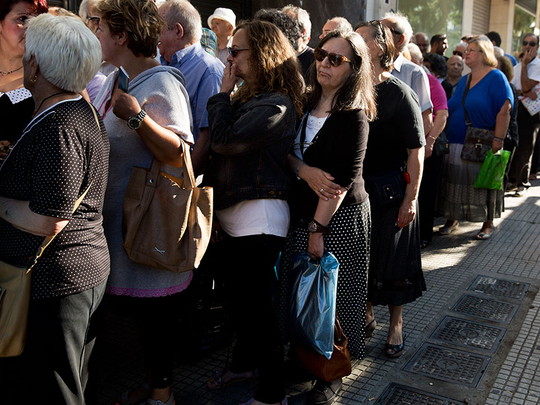
The crisis in Greece is getting ever more complicated despite the new — and third — bailout programme approved by Eurozone leaders this week.
The latest rescue funding plan comes after earlier releases of financial aid evaporated without leaving any positive residue on Greece’s economy and living conditions of its populace. On the contrary, the situation deteriorated further despite Eurozone’s efforts being supported by the International Monetary Fund. Greece’s GDP dropped from €240 billion (Dh972 billion) in 2008 to €200 billion in 2014.
As a start, we need to ask this question — Is Greece a poor country? The answer is absolutely not. The country is rich in agricultural resources and in abundant tourist potential, signifying there is something intrinsically wrong in the economic and financial system of this European country.
The crisis is nothing new for Greece ... it dates back to the post-Second World War era. Since then, Greece has lurched from one crisis to another, a fact that had not gone unnoticed by the EU when it accepted Greece into the single currency. Greece joined the EU despite its accumulated debt and deteriorating financial conditions.
Then, wherein lies the problem? The base lies in the structural imbalance of its economy, the corruption and notoriously bad financial management. Greece is one of the most corrupt countries in Europe, pervading all layers of its society. The poor evade paying for public services, including for transport, while the rich evade paying taxes altogether. The latter has accumulated to €15 billion plus, as tax evaders get ever more creative in finding loopholes.
The media has highlighted the story of a businessman who established his office on board a ship off Greece’s shores and refused to pay corporate taxes because it is located off-land, and therefore, he has not held liable by the tax authorities. Therefore, any attempt to pay off European and international funding will not work without radical reforms by Greece to tackle its structural imbalance and general financial conditions.
This is what has been confirmed by Eurozone leaders as a precondition for the latest bailout programme.
In his speech before the European Parliament last week, the Greek Prime Minister said that he intends to reform the state system and address the problem of tax evasion. However, a Belgian member of the parliament retorted that they have been hearing about reforms for a long time but do not see anything on the ground.
Corruption
Despite the importance of this step, which comes late and chances of its success remain in doubt, this alone will not resolve the deep financial crisis in Greece, where public debt reached 180 per cent of GDP and the Treasury is empty because corruption swallowed up a portion of the loans and subsidies received since 2009.
Greece must pay up €320 billion, even as the leftist government asks for a part waiver without making any rational justifications. The demand is illogical because creditors are not charitable organisations.
Germany favours sending new aid rather than calling off the debt. Greece will remain like a well without a bottom and swallowing more EU largesse, particularly German funds. Athens also threatens the Eurozone as a whole as it has not shown any sign that it can resolve the structural economic and financial issues.
The government played on its citizens patriotic feelings and involved them in a referendum in which many of those who voted did not know what its consequences would be. At the same time, Germany’s taxpayers protest pumping more money into a clinically dead economy that is Greece now.
A long-term solution must be determined by the Greeks themselves. It is a simple solution, which is “We have to work hard and more, since work is the key to success”, as referred to by a Greek businesswoman in a television interview.
It is well known that Greece has the minimum rate of productivity in Europe. Without conducting radical reforms of its financial, tax and pension systems, the crisis will happen again and again and the third rescue programme will not work.
However, this will not absolve European financial institutions, especially German ones, from responsibility. Because they went too far in providing financial facilities to Greece despite its deep and structural problems.
Dr Mohammad Al Asoomi is a UAE economic expert and specialist in economic and social development in the UAE and the GCC countries.












